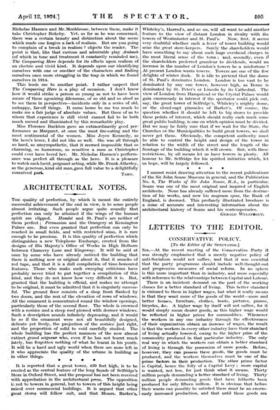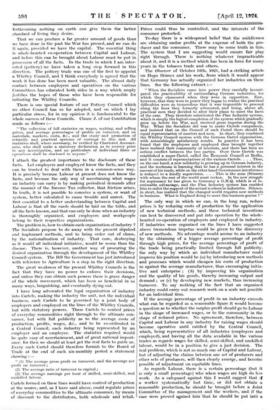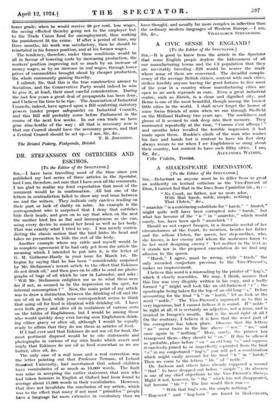LETTERS TO THE EDITOR.
CONSERVATIVE POLICY.
[To the Editor of the SrEcrsroft.]
Sza,—At the recent meeting of the Conservative Party it was strongly emphasized that a merely negative policy of anti-Socialism would not suffice, and that it was essential that the party programme should include well-thought-out and progressive measures of social reform. In no sphere is this more important than in industry, and more especially with reference to the relationships between Capital and Labour.
There is an insistent demand on the part of the working classes for a better standard of living. This better standard is visioned to them in higher wages, but what it really means is that they want more of the goods of the world—more and better houses, furniture, clothes, boots, pictures, pianos, bicycles, &c. A higher wage by itself will not suffice, for it -would simply mean dearer goods, as this higher wage would be 'reflected in higher prices for commodities. Whenever the workers in any one industry through the effectiveness of their organization obtain an increase of wages, the result is that the workers in every other industry have their standard of living actually lowered, owing to the higher price of the commodity produced in that particular industry. The only real way in which the workers can obtain a better standard of living is through the possession of more goods. Before, however, they can possess these goods, the goods must be produced, and the workers themselves must be one of the prime factors in their production. The other prime factor is Capital, hence the folly of a Capital Levy ; more capital is wanted, not less, for just think what it means. Thirty million people demanding a better standard of living. Thirty million people demanding goods that have hitherto been produced for only fifteen million. It is obvious that before their wants can possibly be satisfied there must be an enorm- ously increased production, and that until these goods are
forthcoming nothing on earth can give them the better standard of living they desire.
That we can produce a far greater amount of goods than we have done in the past the War has proved, and we can do it again, provided we have the capital. The essential thing is whole-hearted co-operation between Capital and Labour, and before this can be brought about Labour must be put in possession of all the facts. In the trade in which I am inter- ested (pottery) we have taken a long step forward in this direction. The pottery trade was one of the first to appoint a Whitley Council, and I think everybody is agreed that the work it has done has been most valuable. The almost daily contact between employers and operatives on the various Committees has educated both sides in a way which amply justifies the hopes of those who have been responsible for initiating the Whitley Councils.
There is one special feature of our Pottery Council which no other Council has so far adopted, and on which I lay particular stress, for in my opinion it is fundamental to the whole success of these Councils. Clause J. of our Constitution reads as follows :-
" The collection of full statistics on wages, making, and selling prices, and average percentages of profits on turnover, and on materials, markets, costs, &c., and the study and promotion of scientific and practical systems of coatings to this end. All statistics shall, where necessary, be verified by Chartered Account- ants, who shall make a statutory declaration as to secrecy prior to any investigation, and no particulars of individual firms or operatives shall be disclosed to anyone."
I attach the greatest importance to the disclosure of these facts. Let employers and employed know the facts, and they can be trusted to deal' with them in a common-sense way. It is precisely because Labour at present does not know the facts, and because the only way of ascertaining what wages an industry can carry is by making periodical demands after the manner of the Income Tax collector, that friction arises. In truth, it is not possible to conceive a system, or want of system, better calculated to cause trouble and unrest. The first essential to a better understanding between Capital and Labour is that all the cards should be laid on the table, and all the facts known, and that can only be done when an industry is thoroughly organized, and employers and workpeople belong to their respective organizations.
The problem is, how to obtain such organization of industry ?
The Socialists propose to do away with the present slipshod and haphazard methods, and to bring order out of chaos,
by the nationalization of industry. That cure, destroying as it would all individual initiative, would be worse than the disease. There is, however, another way of procuring the desired organization through the development of the Whitley Council system. The Bill the Government has just introduced with reference to Agriculture is a step in the right direction.
The great weakness of the present Whitley Councils is the fact that they have no power to enforce their decisions, and unless they can obtain such powers there is grave danger of the whole movement, which has been so beneficial in so many ways, languishing, and eventually dying out.
I have long advocated the legal organization of industry into Cartels, making the industry the unit, not the individual business, such Cartels to be governed by a joint body of employers and employed on the lines of the Whitley Councils, but with statutory powers. These Cartels to control prices of everyday commodities right through to the ultimate con- sumer, but with full publicity as to the average costs of production, profits, wages, &c., and to be co-ordinated in a Central Council, each industry being represented by an employer and an employee. The statistics required would be quite easy of ascertainment, and of great national import- ance, for then we should at least get the real facts to guide us.
Every such Cartel should therefore furnish to the Board of Trade at the end of each six-monthly period a statement showing :—
" (1) The average gross profit on turnover, and the average net profit on turnover ; (2) The average ratio of turnover to capital ;
(3) The average earnings per hour of skilled, semi-skilled, and unskilled labour.
Cartels formed on these lines would have control of production at the source, and, as I have said above, could regulate prices of everyday commodities to the ultimate consumer, by means of discount to the distributors, both wholesale and 'retail. Prices could thus be controlled, and the interests of the consumer protected.
To-day there is a widespread belief that the middlemen are obtaining undue profits at the expense of both the pro- ducer and the consumer. There may be some truth in this. The system that I am suggesting would ensure fair play right through. There is nothing whatever impracticable about it, and it is a method which has been in force for many years in the tobacco trade and others.
The Observer of October 16th, 1921, had a striking article on Hugo Stinnes and his work, from which it would appear that Germany has actually organized her industries on these lines. See the folloWing extract :—
" When the Socialists came into power they carefully investi- gated the practicability of nationalizing German industries, for which they clamoured when they were in opposition. Now, however, that they were in power they began to realize the practical difficulties were so tremendous that it was impossible to proceed along the lines they formerly advocated, and being, above all, practical men they decided to alter' their plans to meet the facts of the case. They therefore substituted the Plan Industry system, which is simply the logical completion of the system which gradually grew up before the War, and received great impetus during the War. What the Socialists did was to make Cartels compulsory, and insisted that on the Council of such Cartel there should be equal representation of masters and men. In short, they combined the Whitley Council system with the German Cartel organization, with astonishingly satisfactory results. In practice it has been found that the employers and employed thus brought together have realized their community of interests, and there has been no serious conflict between the two parties. Over these Cartels was established a super-Cartel, called the Economic Council at Berlin, and it consists of representatives of the various Cartels. . . . Thus, on the one hand, a new solidarity is growing up in German industry, and the workman is learning that he has a personal interest in the success of his trade, while on the other hand Government interference is reduced to a kindly supervision.. . . This is -the man (Stinnes) with whom the rest of the world must reckon. In the new struggle for supremacy he has given to Germany a G.H.Q. which is of in- estimable advantage, and the Plan Industry system has enabled him to enlist the support of the actual workers in industries. Stinnes, in short, has realized that the changed world requires new methods in business. What is England doing to meet this business genius "
The only way in which we can, in the long run, reduce prices is by reducing costs of production by the application of new technical methods, and these technical inventions can best be discovered and put into operation by the whole- hearted co-operation of employers and employed in industry. If industries were organized on the lines I have suggested above tremendous impetus would be given to the discovery of new methods. No advantage would accrue to an industry by the obtaining of a bigger average percentage of profit through high prices, for the average percentage of profit of the trade being practically limited through full publicity, the only way by which an individual manufacturer could improve his position would be (a) by introducing new methods and processes which would cheapen his costs of production as against the average manufacturer, thus encouraging initia- tive and enterprise ; (b) by improving his organization and the quality of his goods, thereby increasing output and demand ; or (c) by developing new markets, thus increasing turnover. To say nothing of the fact that an organized industry could carry out research work on a scale not possible for an individual firm.
If the average percentage of profit in an industry exceeds what can be regarded as a reasonable figure it would become a question as to whether the surplus profit should go to Labour in the shape of increased wages, or to the community in the
shape of reduced prices. No agreement, therefore, between Capital and Labour in any industry for raising wages should become operative until ratified bys the Central Council,
whibh, being representative of all industries (employers and employed), and having all the data available in the various trades as regards wages for skilled, semi-skilled, and unskilled labour, would be in a position to give a just decision. The real problem, which is not so much one of Capital and Labour, but of adjusting the claims between one set of producers and other sets of producers, will then clearly emerge, and becolhe possible of adjustment on equitable lines.
As regards Labour, there is a certain percentage (but it is only a small percentage) who when wages are high do less work. As a safeguard against this I would suggest that if
a worker systematically lost time; or 'did not obtain a reasonable production, he should be brought before a Joint Committee of the man' agement and the workers, and if the
Case were proved against Iiiii.that he shbuld be put into a
lower grade, when he would receive 20 per cent. less wages, the saving effected thereby going not to the employer but to the Trade Union fund for unemployment, thus making the punishment fit the crime. If after a period of time, say three months, his work was satisfactory, then he should be reinstated in his former position, and at his former wages.
The tendency, therefore, under these conditions would be all in favour of lowering costs by increasing production, the workers' position improving not so much by an increase of money wages, as by an increase in real wages, through lower prices of commodities brought about by cheaper production, the, whole community gaining thereby.
I submit, Sir, that this is the true constructive answer to Socialism, and the Conservative Party would indeed be wise to give it, at least, their most careful consideration. During the last few years a great deal of propaganda has been done, and I believe the time to be ripe. The Association of Industrial Councils, indeed, have agreed upon a Bill conferring statutory powers (under proper safeguards) on Industrial Councils, and this Bill will probably come before Parliament in the course of the next few weeks. In our own trade we have gone nine-tenths of the way ; all that is necessary now is that our Council should have the necessary powers, and that a Central Council should be set up.—I am, Sir, &c., T. B. JOHNSTON. The Bristol Pottery, Fishponds, Bristol.












































 Previous page
Previous page